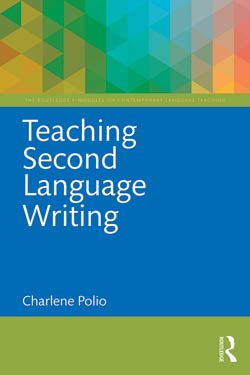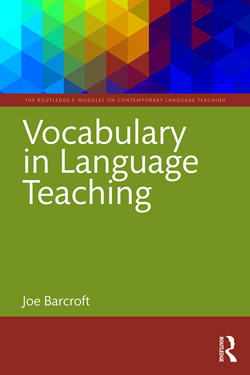Welcome!
The Routledge E-Modules on Contemporary Language Teaching
Series Editors: Bill VanPatten, Michigan State University, USA, and Gregory D. Keating, San Diego State University, USA
The Routledge E-Modules on Contemporary Language Teaching series is an exciting and innovative approach to topics for the novice or in-training teacher of languages. Written in an easily accessible style and delivered in e-format only, specialists and experts provide the latest thinking on a variety of issues that form the foundation of language-teacher knowledge and practice: the nature of language and communication, second language acquisition, interactive tasks, assessment, focus on form, vocabulary development, technology in language teaching, among many others.
Each module serves as a self-contained unit to be used on its own or as part of an introductory course on language teaching. Instructors may “mix and match” modules to create their own readings for a course on language teaching. The modules may serve as primary reading or as supplemental reading, with each module offering points of reflection, discussion questions, self-quizzes, and a reading list for those who wish to delve further into the topic.
If you do not have an e-reader, you can read directly on your computer using Kindle for PC or Mac: https://www.amazon.com/gp/digital/fiona/kcp-landing-page?ie=UTF8&ref_=kcp_pc_mkt_lnd
eModules

Teaching Second Language Writing by Charlene Polio
By Charlene Polio
This module explores the purposes of and methods for teaching second language writing. Engaging and accessible, Teaching Second Language Writing is organized into three sections that mainly focus on activities, approaches and real-life writing tasks and genres that are the most applicable and useful for the language teaching classroom.
Charlene Polio is a Professor and Associate Chair in the Department of Linguistics & Germanic, Slavic, Asian, & African Languages at Michigan State University, USA.
Purchase the eBook
Amazon | Amazon UK | Barnes and Noble | eBooks.com | Google Play | Kobo

Language
By Bill VanPatten
This module on the nature of language aims to provide the novice and even experienced teacher with a broad and accessible picture of language as a formal system. As such, it covers topics such as the nature of words, sounds, and syntax. The module places particular emphasis on the abstract and complex nature of language and how it does not resemble typical pedagogical rules and so-called rules of thumb often used with language learners.
Purchase the eBook
Amazon | Amazon UK | Barnes and Noble | eBooks.com | Google Play | iTunes | Kobo

Communication and Skill
By Bill VanPatten
In this module on communication, the reader explores the nature and consequences of a particular definition of communication: the expression and interpretation of meaning in a given context. Special attention is given to context (i.e., physical setting, participants, purpose of communication) and how these impact how we think about communication in language classrooms.
Purchase the eBook
Amazon | Amazon UK | Barnes and Noble | eBooks.com | Google Play | iTunes | Kobo

Second Language Acquisition: The Basics
By Gregory D. Keating
Starting from the premise that language instruction should be informed by how humans learn language, this module on second language acquisition (SLA) aims to provide teachers at any level with a comprehensive and up-to-date introduction to the key findings about how second languages are learned in adulthood. This module explores a variety of topics, including the mechanisms in the mind responsible for language acquisition, the roles that input and output play in acquisition, and how language develops in the learner’s mind over time. Furthermore, the module explores the many factors believed to impact the outcome of SLA, such as the role of the native language, individual differences in aptitude and motivation, and age of acquisition.
Purchase the eBook
Amazon | Amazon UK | Barnes and Noble | eBooks.com | Google Play | iTunes | Kobo

Vocabulary in Language Teaching
By Joe Barcroft
This module focuses on the pivotal role of vocabulary in language acquisition, communication, and instruction. It first reviews the nature of vocabulary knowledge, the mental lexicon, and different contexts of vocabulary learning. It then explains how we acquire vocabulary and refine vocabulary knowledge over time. The primary emphasis is on how language instructors can promote evidence-based vocabulary instruction in the classroom. To this effect, the module highlights some telling research on the effects of specific tasks (such as sentence writing and copying target words) and different ways of presenting target words (such as having multiple talkers instead of a single talker produce the target words) and outlines an effective approach to vocabulary instruction, one that emphasizes multiple presentations of target vocabulary, specificity in the relationship between task type and learning outcomes, and the gradual build-up of language-specific vocabulary knowledge over time. A sample lesson based on this approach is also provided.
Purchase the eBook
Amazon | Amazon UK | Barnes and Noble | eBooks.com | Google Play | iTunes | Kobo

Interactive Tasks
By Michael J. Leeser and Justin P. White
This module on interactive tasks provides teachers with an overview of the nature of communication and explores the ways in which interactive tasks can promote communicative exchanges among students and teachers. The module provides guidelines for developing tasks, along with examples and options for their use in various types of language courses, including beginning level language classes and more advanced language courses focusing on culture, linguistics, literature, and film.
Purchase the eBook
Amazon | Amazon UK | Barnes and Noble | eBooks.com | Google Play | iTunes | Kobo

Focusing on Form in Language Instruction
By Wynne Wong and Daphnée Simard
This module on focusing on form in language instruction provides novice and experienced instructors with pedagogical techniques to help second language learners acquire formal elements of an L2. Taking the position that the development of a linguistic representation requires input, the pedagogical interventions presented in this module—textual enhancement, structured input, and dictogloss—all work with meaning-bearing input in some way. These techniques aim to increase the likelihood that learners focus on aspects of language useful or necessary for building mental representation. The module also discusses how explicit information may play a supporting role in helping learners process input.
Purchase the eBook
Amazon | Amazon UK | Barnes and Noble | eBooks.com | Google Play | iTunes | Kobo

Technology in Language Learning: An Overview
By Bryan Smith
This module on computer assisted language learning provides novice and experienced second and foreign language (L2) teachers alike with an introduction to the field of computer assisted language learning (CALL). The module first provides a historical overview of the field and then explores the most widely researched areas within CALL. The module examines findings of research into computer-mediated communication for L2 learning as well as L2 skill area instruction in technology-enhanced settings. The unit then turns to a discussion of teacher and learner standards for using CALL, followed by a discussion of how one may find and evaluate CALL resources appropriate for specific instructional contexts. The module ends with an introduction to four of the newest and most exciting areas in CALL: gaming, fan fiction, digital storytelling, and mobile assisted language learning.
Purchase the eBook
Amazon | Amazon UK | Barnes and Noble | eBooks.com | Google Play | iTunes | Kobo